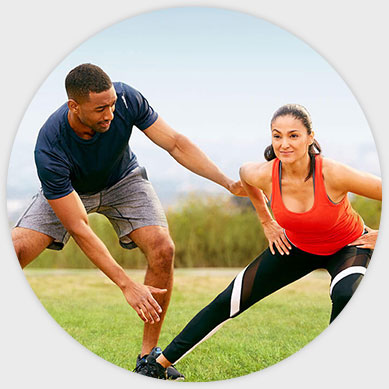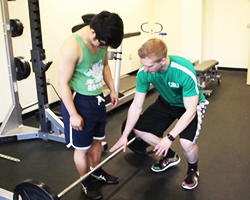
Personal trainers should have insurance. There are a variety of types of insurance for personal trainers. Here are a few: Product liability; Professional liability; and Business owner's insurance. CPH specializes as a personal trainer's insurance agent. NFPT recommends professional liability insurance. Bodily injury claims are the most common. However, you should also consider claims for libel or slander and wrongful invasions of privacy.
Product liability insurance
Injury can happen at anytime, and even with the most sophisticated equipment, there is still the possibility of injury. Personal training businesses can take out product liability insurance to protect themselves from this risk. It covers medical bills for clients injured by your equipment and any legal costs you might incur. Workers' compensation, which is required in most U.S. States, can be used by clients to cover any injuries they sustain while using your equipment. A similar policy covers vehicles used for business purposes.

Professional liability insurance
Personal trainers should invest in professional liability insurance. You will be covered for your legal fees as well as compensation in the case of a lawsuit. Professional liability insurance will cover you against HIPAA penalties and disciplinary actions. Visit our website for more information. It's simple to buy and maintain. Here are some tips to help you choose the right policy:
The policy for the business owner
The Business Owner's Insurance can provide protection for your personal training business in many ways. Typically, this type of policy covers the general liability and commercial property of your business, as well as the income and extra expenses of your business. This policy also covers losses that are not related to your business, such as lost revenue or closing costs. While you may not experience any of these risks directly, it is important to be aware of the different types of insurance policies that are available.
General liability insurance
If you offer training to others, professional liability insurance is essential for your business. This type insurance covers the cost of medical expenses, lawsuits, or settlements for clients who are injured. You may also choose to purchase professional liability insurance, which covers the cost of equipment replacement and legal fees. Professional liability insurance covers all claims that arise from professional negligence. Also known as errors or omissions insurance. This type of insurance is recommended for clients who provide fitness training.

Discounted policy available to NETA members
A member of the NETA can receive a discounted policy on personal insurance training. In addition to this, you will be able to get a free professional website, as well as discounts on fitness products and other services. NETA is a nonprofit organization dedicated to providing education to fitness professionals. The organization offers certifications as a Personal Trainer and Group Exercise Instructor, as well specialty certifications such as Tabata, Yoga, Pilates, Tabata and Wellness Coaching. You will also be able to take continuing education courses in Tabata, which is a high-intensity cardio workout that helps burn calories and improve cardiovascular fitness.
FAQ
What is exercise good for?
Exercise is a great way to lose weight, increase your energy, lower stress levels, strengthen your muscles, and improve your sleep quality. Exercise can improve mood, self-esteem and productivity as well as reduce the risk of developing heart disease.
What are cardio exercises?
Cardiovascular exercises are those that require your heart and lungs to work harder than normal. These include swimming, running, bicycling or rowing. These activities help you burn fat and increase your metabolism. They can also help you stay fit by strengthening your heart and lungs.
Do I need to warm up before exercising?
Warming up prior to an activity helps reduce muscle soreness. It also improves performance. There are many methods you can use to warm up, including running, jumping rope and stretching. You can start slowly and increase your intensity gradually.
Can I exercise after eating?
It all depends on which type of exercise you are performing. Avoid strenuous exercise after meals as it can cause stomach cramps. Light aerobic activities, such as walking or biking, are better.
Is it safe and legal to exercise in cold conditions?
Exercise outside whenever possible. While the air temperature is a major factor in determining whether or not it's safe to exercise outside, it's not the only one. Also, visibility, wind speed and humidity all play a significant role. Layers of clothing will protect you from rain and wind chill if you exercise outdoors in inclement climates.
What should I do if I'm working out?
Alcohol has calories, so it's not recommended to consume large amounts while working out. The moderate intake of alcohol (one a day) may improve endurance for workouts. It may reduce fatigue and muscle soreness from intense exercise.
Can exercise help me lose weight?
Yes. Regular exercise will help to reduce weight by burning more calories. Your metabolism will remain high, so you can continue to burn calories even though you're not exercising.
Statistics
- In high-income countries, 26% of men and 35% of women were insufficiently physically active, as compared to 12% of men and 24% of women in low-income countries. (who.int)
- Globally, 28% of adults aged 18 and over were not active enough in 2016 (men 23% and women 32%). (who.int)
- Physical activity confers the following maternal and fetal health benefits: a decreased risk of pre-eclampsia, gestational hypertension, gestational diabetes (for example, 30% reduction in risk) (who.int)
- One study showed that adults who watch more than 4 hours of television daily had an 80% higher risk of death from cardiovascular disease. (heart.org)
External Links
How To
How To Burn Belly Fats Faster
When we are trying to lose weight, belly fat is often seen as a problem. But if you think about it, Belly Fat is actually a good thing. It's the amount of fat stored around your stomach that protects your organs from getting damaged. So let's see how to burn belly fat fast.
The main factors that lead to body fat storage are stress and lack exercise. Stress makes us feel hungry constantly because it stimulates the production of the cortisol hormone. Cortisol can increase insulin levels in the blood. The insulin then stores extra calories as fat. Lack of sleep causes the release of adrenaline into our system, leading to increased appetite. These extra calories can be broken down by exercising.
There are many ways you can reduce belly fat. Depending on your budget, you can try each one. These are some great tips to help you lose belly fat fast.
-
Reduce your food intake. You should eat smaller meals throughout the day than you would if you ate three big meals. This way, you'll consume fewer calories overall.
-
Drink plenty of water. Water helps flush out toxins from the body and keeps you hydrated. Also, drinking water before every meal will keep you feeling full longer so you won't overeat.
-
Avoid snack foods that are unhealthy. If you're looking for quick fixes, snack foods like chips, cookies, candies, etc. Although tempting, they can be very unhealthy. These sugary treats have lots of empty calories so avoid them. Choose healthy options like whole grains, fruits, vegetables, nuts, seeds and nuts.
-
Strength training should be done at least three times per week. Strength training builds muscle mass which burns more calories even while resting. It strengthens bones muscles ligaments, tendons and the heart.
-
Move regularly and stretch. Stretching helps to improve flexibility and mobility, which reduces back pain. Walking for 30 minutes is a great way to burn calories.
-
Reduce alcohol intake. Your diet is empty of calories, and alcohol has no nutritional content.
-
You can lose weight slowly. Finding out your current weight is the first step in losing weight. Then calculate your ideal weight by adding 5% to 10% of your total body weight. Once you have established your ideal weight, reduce your daily calorie intake by 500 to 1000 calories each day until you achieve your goal.
-
Avoid processed foods. These foods are high on sugar, salt, and additives. Even though they can be very convenient, these foods lack sufficient nutrients to support your health.
-
Don't skip breakfast! Consuming breakfast increases concentration, memory and energy levels. You should have protein (such as eggs) and fiber (such as oats) for breakfast.
-
Have regular bowel movements. Constipation or irregularity can lead to gas and bloating. You can prevent this by drinking lots of water and increasing your fiber intake.